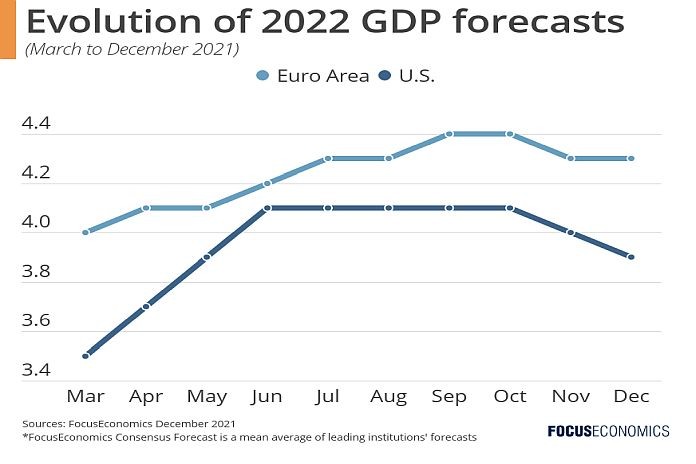By FocusEconomics Insights
ASIA – Heightened uncertainty caused by the new Omicron variant is undermining consumer and business confidence around the world, due to the potential for another round of lockdowns and border restrictions. Earlier this year our panel of analysts severely downgraded Asia’s economic outlook for 2021 due to the impact of the Delta variant, which could foreshadow what’s in store for the Euro area and developed economies more broadly.
Governments across Europe have already introduced precautionary restrictions such as travel bans, and they are likely debating whether tougher measures are necessary ahead of the busy holiday season, which could derail the economic recovery at the tail end of the year. Pharmaceutical companies responsible for developing vaccines have stated their concerns over whether vaccinated individuals will be safe from the new variant. That said, the current understanding of the new strain is too limited to make strong conclusions on its effect on the population, and consequently its potential impact on the global economic recovery. Its medium-term effect will depend on whether it is more transmissible, whether existing vaccines are less effective against it and whether it causes more serious illness.
A more transmissible, vaccine-resistant and dangerous variant could weigh heavily on the global economic recovery going forward. In particular, tougher restrictions to curtail its spread would hamper mobility and hurt still-frail labor markets and household spending. Meanwhile, the impact on inflation would be more ambiguous. On the one hand, lockdowns would cause further turmoil for supply chains and lead to shortages of goods, but on the other hand, depressed consumer sentiment and limited mobility could weigh heavily on demand, which would offset inflationary pressures.
That said, both firms and consumers are better adapted to restrictions almost two years into the pandemic, while some governments may be reluctant to reimpose harsh lockdowns, which would dilute their economic impact. Looking at a more optimistic scenario, current vaccines will remain effective against Omicron, limiting its potential harm. Moreover, even in the event that existing vaccines are less effective, vaccine producers have claimed that they will be able to alter their formulas to better combat the variant within a relatively short timeframe, while new antiviral drugs—being considered for approval for use in the U.S. this month—will likely offer further protection.
Insights from Our Analyst Network
Analysts at Swedbank caution against overreaction to Omicron’s appearance:
“At the end of the day, it seems like markets overreacted on Friday, also owing to thin market liquidity. It seems likely that Omicron will spread quickly and overtake Delta as the dominant strain. In the very short term, this could make the current wave in most of Europe worse, but with effective vaccines and new treatments soon to be available, we do not believe it will disrupt the broad economic recovery.”
Meanwhile, analysts at ANZ Bank suggest what might happen in a worst-case scenario:
“Let’s take aside the worst-case scenario, where Omicron manages to avoid vaccine coverage and generates a spike in hospitalisations and a fresh round of demand-sapping restrictions across the globe. There is still a meaningful risk that, even with lower levels of severity, activity and growth are negatively affected.”





